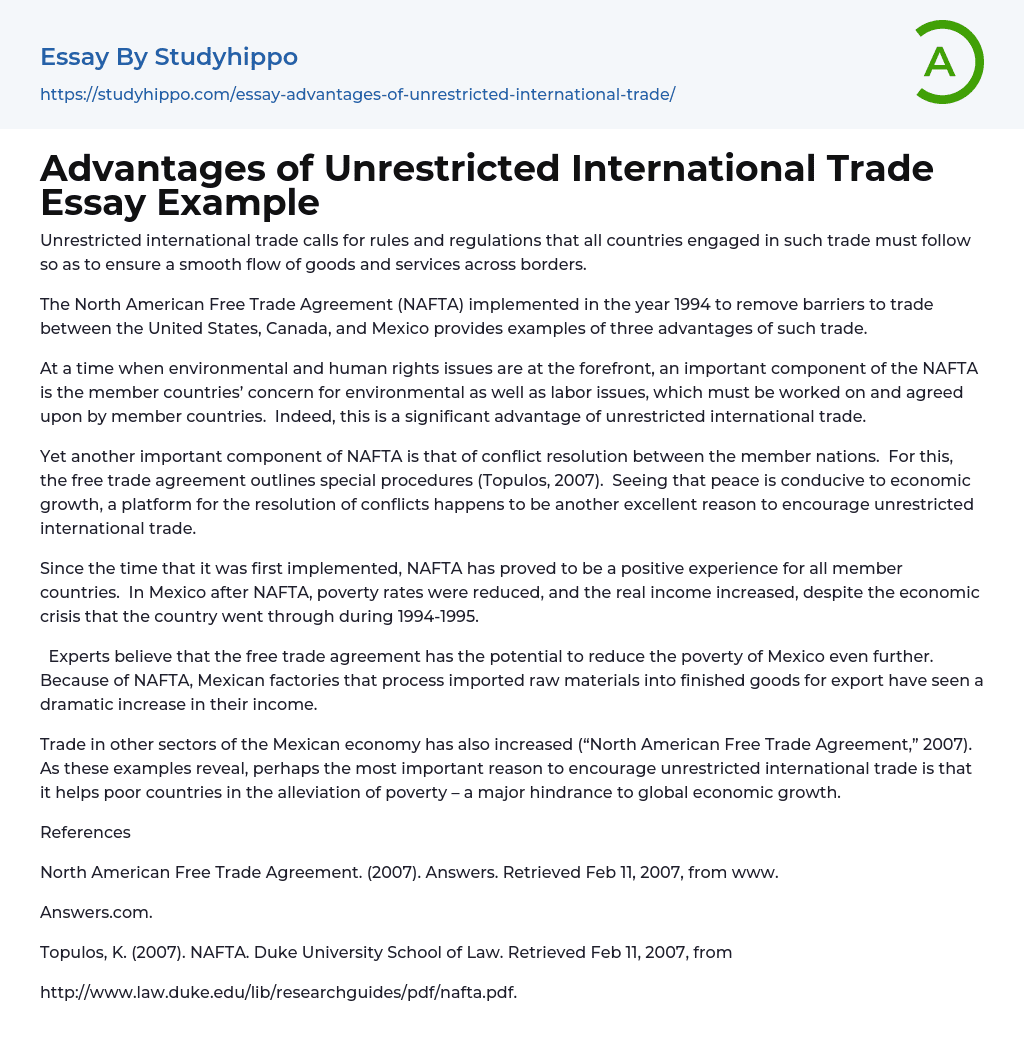Unrestricted international trade calls for rules and regulations that all countries engaged in such trade must follow so as to ensure a smooth flow of goods and services across borders.
The North American Free Trade Agreement (NAFTA) implemented in the year 1994 to remove barriers to trade between the United States, Canada, and Mexico provides examples of three advantages of such trade.
At a time when environmental and human rights issues are at the forefront, an important component of the NAFTA is the member countries’ concern for environmental as well as labor issues, which must be worked on and agreed upon by member countries. Indeed, this is a significant advantage of unrestricted international trade.
Yet another important component of NAFTA is that of conflict resolution between the member nat
...ions. For this, the free trade agreement outlines special procedures (Topulos, 2007). Seeing that peace is conducive to economic growth, a platform for the resolution of conflicts happens to be another excellent reason to encourage unrestricted international trade.
Since the time that it was first implemented, NAFTA has proved to be a positive experience for all member countries. In Mexico after NAFTA, poverty rates were reduced, and the real income increased, despite the economic crisis that the country went through during 1994-1995.
Experts believe that the free trade agreement has the potential to reduce the poverty of Mexico even further. Because of NAFTA, Mexican factories that process imported raw materials into finished goods for export have seen a dramatic increase in their income.
Trade in other sectors of the Mexican economy has also increased (“North America
Free Trade Agreement,” 2007). As these examples reveal, perhaps the most important reason to encourage unrestricted international trade is that it helps poor countries in the alleviation of poverty – a major hindrance to global economic growth.
References
North American Free Trade Agreement. (2007). Answers. Retrieved Feb 11, 2007, from www.
Answers.com.
Topulos, K. (2007). NAFTA. Duke University School of Law. Retrieved Feb 11, 2007, from
http://www.law.duke.edu/lib/researchguides/pdf/nafta.pdf.
- American Dream essays
- Barriers To Entry essays
- Capitalism essays
- Central Bank essays
- Compensation essays
- Consumerism essays
- Economic Development essays
- Economic Growth essays
- Economic Inequality essays
- Economic System essays
- Economy essays
- Employment essays
- Export essays
- Finance essays
- Free Trade essays
- Gross Domestic Product essays
- Human Development essays
- Income Inequality essays
- Industry essays
- Inflation essays
- International Business essays
- International Trade essays
- Macroeconomics essays
- Materialism essays
- Max Weber essays
- Microeconomics essays
- Minimum Wage essays
- Monetary Policy essays
- Monopoly essays
- Pricing essays
- Profit essays
- Recession essays
- resources essays
- Taxation essays
- Trade essays
- Unemployment essays
- Warehouse essays
- World economy essays
- Absolutism essays
- Appeal essays
- Bourgeoisie essays
- Contras essays
- Corporate Governance essays
- Corruption essays
- Democracy essays
- Democratic Party essays
- Developed Country essays
- Dictatorship essays
- Elections essays
- European Union essays




